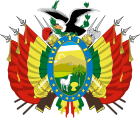
A | B | C | D | E | F | G | H | CH | I | J | K | L | M | N | O | P | Q | R | S | T | U | V | W | X | Y | Z | 0 | 1 | 2 | 3 | 4 | 5 | 6 | 7 | 8 | 9
This article needs to be updated. (March 2021) |
 |
|---|
|
|
The politics of Bolivia takes place in a framework of a presidential representative democratic republic, whereby the president is head of state, head of government and head of a diverse multi-party system. Executive power is exercised by the government. Legislative power is vested in both the government and the two chambers of parliament. Both the Judiciary and the electoral branch are independent of the executive and the legislature. After the 2014 Bolivian general election, 53.1% of the seats in national parliament were held by women, a higher proportion of women than that of the population.[1]
History
The Bolivian Civil War between the Conservatives and the Liberals ended in 1899 with the latter's victory; a liberal era began that lasted until 1920. A system of public education developed, accompanied by moderate anticlericalism: Catholicism lost its status as the only religion recognized by the State in 1906 and civil marriage was adopted in 1911. Bolivian liberalism, however, clearly lost its progressive character to coexist with the interests of the new tin fortunes (the liberal era is sometimes also considered to be the tin era, with tin production having increased considerably), landowners and the army. Inspired by the example of the Ecuadorian Liberal Revolution of 1895 led by Eloy Alfaro, a new liberalism organized itself into a republican party and expressed some social concerns against the domination of the liberal oligarchy.[2]
Constitution

Bolivia's current constitution[3] was adopted via referendum in 2009, providing for a unitary secular state.
Executive branch

The president is directly elected to a five-year term by popular vote. A candidate needs either an absolute majority or 40% and a 10-point lead to win the election. In the case that no candidate is elected in the first vote, a run-off vote elects the president from among the two candidates most voted in the first vote.[4]
Hugo Banzer was elected president in 1997. Although no candidate had received more than 50% of the popular vote in the national election, Banzer won a congressional runoff election on 5 August 1997 after forming the so-called "megacoalition" with other parties. He resigned in August 2001 and was substituted by his vice president Jorge Quiroga. In August 2002, the winner of the national election Gonzalo Sánchez de Lozada was chosen president by Congress, winning an 84–43 vote against popular vote runner-up Evo Morales. Elected president Gonzalo Sánchez de Lozada resigned in October 2003, and was substituted by vice-president Carlos Mesa who governed the nation until his resignation in June 2005. He was replaced by chief justice of the Supreme Court Eduardo Rodríguez, acting as caretaker president. Six months later, on December 18, 2005, cocalero leader Evo Morales was elected president.
A group of MEPs acting as election observers oversaw a constitutional referendum in Bolivia that gave more power to indigenous peoples 25 January 2009. The tightly fought referendum laid out a number of key reforms such as allowing President Evo Morales to stand for re-election, state control over natural gas and limits on the size of land people can own.
